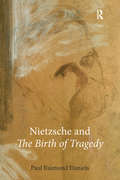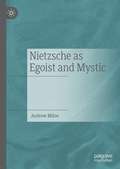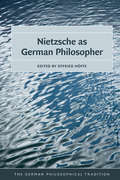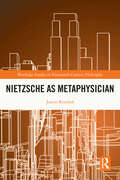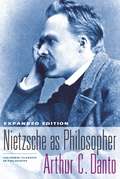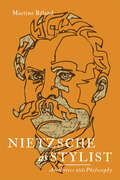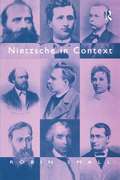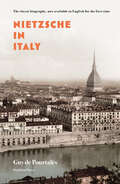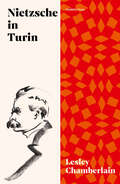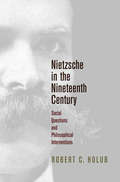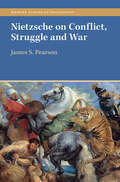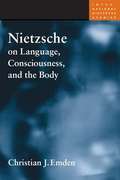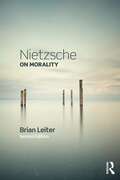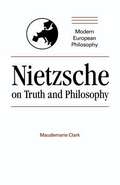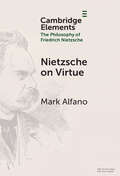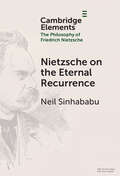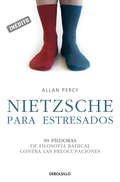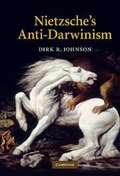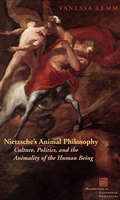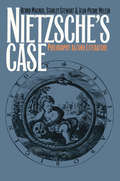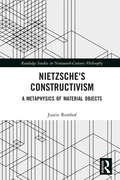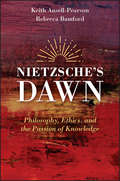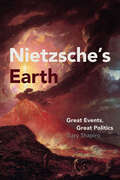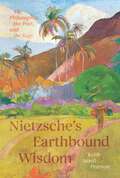- Table View
- List View
Nietzsche and “The Birth of Tragedy”
by Paul Raimond DanielsNietzsche's philosophy - at once revolutionary, erudite and deep - reaches into all spheres of the arts. Well into a second century of influence, the profundity of his ideas and the complexity of his writings still determine Nietzsche's power to engage his readers. His first book, "The Birth of Tragedy", presents us with a lively inquiry into the existential meaning of Greek tragedy. We are confronted with the idea that the awful truth of our existence can be revealed through tragic art, whereby our relationship to the world transfigures from pessimistic despair into sublime elation and affirmation. It is a landmark text in his oeuvre and remains an important book both for newcomers to Nietzsche and those wishing to enrich their appreciation of his mature writings. "Nietzsche and The Birth of Tragedy" provides a clear account of the text and explores the philosophical, literary and historical influences bearing upon it. Each chapter examines part of the text, explaining the ideas presented and assessing relevant scholarly points of interpretation. The book will be an invaluable guide to readers in Philosophy, Literary Studies and Classics coming to "The Birth of Tragedy" for the first time.
Nietzsche as Egoist and Mystic
by Andrew MilneThis book is an attempt to make sense of the tension in Nietzsche’s work between the unashamedly egocentric and the apparently mystical. While scholars have tended to downplay one or other of these aspects, it is the author’s contention that the two are not only compatible but mutually illuminating. This book demonstrates Nietzsche’s sustained interest in mysticism from the time of The Birth of Tragedy right through to the end of his productive life. This book argues against situating Nietzsche’s religious thought in the context of Buddhist or Christian mystical traditions, demonstrating the inadequacy of attempts to mediate between Nietzsche and Meister Eckhart and the Bodhisattva ideal of Mahayana Buddhism. Rather, it is argued that Nietzsche’s egoism and mysticism are best understood in the intellectual context which he himself avowed, according to which his “ancestors” were Heraclitus, Empedocles, Spinoza, and Goethe.
Nietzsche as German Philosopher (The German Philosophical Tradition)
by Otfried HöffeThis collection brings together in translation the finest postwar German-language scholarship on Nietzsche's philosophy, ranging over his concept of irony, his thoughts on music, his relation to the pre-Socratics, his concept of truth, and numerous other topics. Many of the essays appear in English here for the first time, and all are newly translated for the volume.
Nietzsche as Metaphysician (Routledge Studies in Nineteenth-Century Philosophy)
by Justin RemhofThis book defends the controversial view that Nietzsche is a metaphysician against a long-standing tendency to sever Nietzsche from metaphysical philosophy. Remhof presents a metametaphysical treatment of Nietzsche’s writings to show that for Nietzsche the questions, answers, methods, and subject matters of metaphysical philosophy are not only perfectly legitimate, but also crucial for understanding the world and our place within it. The book examines aspects of Nietzsche’s thought that have received little attention in the literature, including his view of what makes metaphysics possible; his metaphysics of science; his naturalized metaphysics; how he appeals to the intuitions of readers; how he employs a priori reasoning; how he uses metaphysical grounding explanations; and how metaphysics is intertwined with topics central to his philosophical thinking, including his understanding of becoming, ethics, nihilism, life, perspective, amor fati, and eternal recurrence. Nietzsche as Metaphysician will be of interest to scholars and advanced students working on Nietzsche and the history of metaphysics.
Nietzsche as Philosopher (Columbia Classics in Philosophy)
by Arthur C. DantoFew philosophers are as widely read or as widely misunderstood as Friedrich Nietzsche. When Danto's classic study was first published in 1965, many regarded Nietzsche as a brilliant but somewhat erratic thinker. Danto, however, presented a radically different picture, arguing that Nietzsche offered a systematic and coherent philosophy that anticipated many of the questions that define contemporary philosophy. Danto's clear and insightful commentaries helped canonize Nietzsche as a philosopher and continue to illuminate subtleties in Nietzsche's work as well as his immense contributions to the philosophies of science, language, and logic.This new edition, which includes five additional essays, not only further enhances our understanding of Nietzsche's philosophy; it responds to the misunderstandings that continue to muddy his intellectual reputation. Even today, Nietzsche is seen as everything from a precursor of feminism and deconstruction to a prophetic writer and spokesperson for disgruntled teenage boys. As Danto points out in his preface, Nietzsche's writings have purportedly inspired recent acts of violence and school shootings. Danto counters these misreadings by elaborating an anti-Nietzschian philosophy from within Nietzsche's own philosophy "in the hope of disarming the rabid Nietzsche and neutralizing the vivid frightening images that have inspired sociopaths for over a century."The essays also consider specific works by Nietzsche, including Human, All Too Human and The Genealogy of Morals, as well as the philosopher's artistic metaphysics and semantical nihilism.
Nietzsche as Stylist: Aesthetics and Philosophy
by Martine BélandAlthough he had a short career, German philosopher Friedrich Nietzsche was a prolific writer, publishing seventeen books in the span of seventeen years. Convinced that “style must live,” he focused obsessively on a wide variety of factors that could potentially affect readers’ uptake of his work, from the craft of preface writing to punctuation choices to the aesthetics of book jackets.Nietzsche as Stylist traces the emergence of the philosopher’s idiosyncratic writing style as he experimented with various rhetorical approaches. Introducing a contextual and historical sensibility to readings of Nietzsche’s published and unpublished works – as well as his correspondence, his journal entries, and other documents he interacted with, such as reviews of his work – the book highlights how Nietzsche’s style evolved in relation to his life and world. Martine Béland situates his writings within contemporaneous debates about the professionalization of academia: by resisting what he felt was an anti-philosophical climate, Nietzsche developed a synesthetic and performative style, hoping that his philosophical ideas could engage diverse readers in multiple ways.Through careful stylistic and contextual analysis, Nietzsche as Stylist explores how Nietzsche cultivated skills as a rhetorician and a writer to bring philosophy into a wider field of attention, thought, and experience.
Nietzsche in Context
by Robin SmallNietzsche in Context presents a comprehensive reinterpretation of Nietzsche’s thought, placing Nietzsche in the context of the philosophers of his own time. Offering a survey of important philosophical themes, Robin Small identifies the writer or writers with whom Nietzsche most felt himself to be engaging in dialogue. This historical dimension is complemented by original analysis and interpretation of the ideas under discussion. Nietzsche in Context takes Nietzsche scholarship into new and fruitful directions. By locating his ideas within a broader context, this book provides a comprehensive reinterpretation of Nietzsche’s thought adding to the continuing interest of his contributions to philosophy.
Nietzsche in Italy
by Guy De PourtalesA fascinating classic account of Nietzsche's travels in Italy at the end of the nineteenth century, where he found inspiration for his major works First published in 1929, Nietzsche in Italy has never been out of print in France but has never been translated into English until now.Endlessly fascinating and highly readable, Nietzsche in Italy will enthrall anyone interested in Nietzsche's relationship with the country that enriched his soul more than any other. For fifteen years, after his first visit to the country in 1876, Nietzsche was repeatedly and irresistibly drawn back to Italy's climate and lifestyle. It was there that he composed his most famous works, including Thus Spake Zarathustra and Ecce Homo. This classic biography follows the troubled philosopher from Rome, to Florence, via Venice, Sorrento, Genoa, Sicily and finally to the tragic denouement in Turin, the city in which Nietzsche found a final measure of contentment before his irretrievable collapse.
Nietzsche in Turin: The End of the Future
by Lesley ChamberlainBeautifully packaged reissue of the vividly lyrical biography of Nietzsche that John Banville called 'a major intellectual event'In 1888, philosopher Friedrich Nietzsche moved to Turin. This would be the year in which he wrote three of his greatest works: Twilight of the Idols, The Antichrist, and Ecce Homo; it would also be his last year of writing. He suffered a debilitating nervous breakdown in the first days of the following year. In this probing, elegant biography of that pivotal year, Lesley Chamberlain undoes popular clichés and misconceptions about Nietzsche by offering a deeply complex approach to his character and work. Focusing as much on Nietzsche's daily habits, anxieties and insecurities as on the development of his philosophy, Nietzsche in Turin offers a uniquely lively portrait of the great thinker, and of the furiously productive days that preceded his decline.
Nietzsche in the Nineteenth Century: Social Questions and Philosophical Interventions (Intellectual History of the Modern Age)
by Robert C. HolubFriedrich Nietzsche is often depicted in popular and scholarly discourse as a lonely philosopher dealing with abstract concerns unconnected to the intellectual debates of his time and place. Robert C. Holub counters this narrative, arguing that Nietzsche was very well attuned to the events and issues of his era and responded to them frequently in his writings. Organized around nine important questions circulating in Europe at the time in the realms of politics, society, and science, Nietzsche in the Nineteenth Century presents a thorough investigation of Nietzsche's familiarity with contemporary life, his contact with and comments on these various questions, and the sources from which he gathered his knowledge.Holub begins his analysis with Nietzsche's views on education, nationhood, and the working-class movement, turns to questions of women and women's emancipation, colonialism, and Jews and Judaism, and looks at Nietzsche's dealings with evolutionary biology, cosmological theories, and the new "science" of eugenics. He shows how Nietzsche, although infrequently read during his lifetime, formulated his thought in an ongoing dialogue with the concerns of his contemporaries, and how his philosophy can be conceived as a contribution to the debates taking place in the nineteenth century. Throughout his examination, Holub finds that, against conventional wisdom, Nietzsche was only indirectly in conversation with the modern philosophical tradition from Descartes through German idealism, and that the books and individuals central to his development were more obscure writers, most of whom have long since been forgotten.This book thus sheds light on Nietzsche's thought as enmeshed in a web of nineteenth-century discourses and offers new insights into his interactive method of engaging with the philosophical universe of his time.
Nietzsche on Conflict, Struggle and War (Modern European Philosophy)
by James S. PearsonNietzsche controversially valorizes struggle and war as necessary ingredients of human flourishing. In this book, James S. Pearson reconstructs Nietzsche's rationale for placing such high value on relations of conflict. In doing so, Pearson reveals how Nietzsche's celebration of social discord is interwoven with his understanding of nature as universal struggle. This study thus draws together Nietzsche's writings on politics, culture, metaphysics, biology and human psychology. It also overcomes an entrenched dispute in the critical literature. In the past, commentators have tended to interpret Nietzsche either as an advocate of radical aristocratic violence or, by contrast, a defender of moderate democratic contest. This book navigates a path between these two opposed readings and shows how Nietzsche is able to endorse both violent strife and restrained competition without contradicting himself.
Nietzsche on Language, Consciousness, and the Body
by Christian J. EmdenNietzsche and the philosopy of language have been a well trafficked crossroads for a generation, but almost always as a checkpoint for post-modernism and its critics. This work takes a historical approach to Nietzsche's work on language, connecting it to his predecessors and contemporaries rather than his successors. Though Nietzsche invited identification with Zarathustra, the solitary wanderer ahead of his time, for most of his career he directly engaged the intellectual currents and scientific debates of his time. Emden situates Nietzsche's writings on language and rhetoric within their wider historical context. He demonstrates that Nietzsche is not as radical in his thinking as has been often supposed, and that a number of problems with Nietzsche disappear when Nietzsche's works are compared to works on the same subjects by writers of the 18th and 19th centuries. Further, the relevance of rhetoric and the history of rhetoric to philosophy and the history of philosophy is reasserted, in consonance with Nietzsche's own statements and practices. Important in this regard are the role of fictions, descriptions, and metaphor.
Nietzsche on Morality: Thoughts on the Prejudices of Morality (Cambridge Texts in the History of Philosophy Ser.)
by Brian LeiterBoth an introduction to Nietzsche’s moral philosophy, and a sustained commentary on his most famous work, On the Genealogy of Morality, this book has become the most widely used and debated secondary source on these topics over the past dozen years. Many of Nietzsche’s most famous ideas - the "slave revolt" in morals, the attack on free will, perspectivism, "will to power" and the "ascetic ideal" - are clearly analyzed and explained. The first edition established the centrality of naturalism to Nietzsche’s philosophy, generating a substantial scholarly literature to which Leiter responds in an important new Postscript. In addition, Leiter has revised and refreshed the book throughout, taking into account new scholarly literature, and revising or clarifying his treatment of such topics as the objectivity of value, epiphenomenalism and consciousness, and the possibility of "autonomous" agency.
Nietzsche on Truth and Philosophy (Modern European Philosophy)
by Maudemarie ClarkThe Nietzsche who emerges from these pages is a subtle and sophisticated philosopher, whose highly articulated views are of continuing interest as contributions to a whole range of philosophical issues. This remarkable reading of Nietzsche will interest not only philosophers, but also readers in neighbouring disciplines such as literature and intellectual history.
Nietzsche on Virtue (Elements in the Philosophy of Friedrich Nietzsche)
by Mark AlfanoThis Element argues for an interpretation of Nietzsche on virtue according to which he believes that because different people have different constellations of instincts and other drives, and because instincts and drives can only be shaped and redirected within boundaries, he recommends different virtues as fitting and conducive to flourishing for different types of people. In his own way, these include curiosity, intellectual courage, the pathos of distance, having a sense of humor, and solitude. This interpretation is supported by both a digital humanities methodology and close readings of passages from Nietzsche's middle, mature, and late works.
Nietzsche on the Eternal Recurrence (Elements in the Philosophy of Friedrich Nietzsche)
by Neil SinhababuThe idea of the eternal recurrence is that we will live the exact same lives again an infinite number of times. Nietzsche appreciates that this would multiply the value of a single life by infinity, justifying intense emotional responses. His unpublished notes provide a cosmological argument for the eternal recurrence that anticipates Poincaré's recurrence theorem. Nietzsche's Thus Spoke Zarathustra describes its hero discovering this idea and struggling to accept the recurrence of all bad things. He eventually comes to love the eternal recurrence because it will bring back all the joys of his life, and teaches this idea to others.
Nietzsche para estresados
by Allan PercyEste libro práctico reúne 99 máximas del genio alemán y su aplicación práctica a todos los entornos y situaciones del día a día. Tanto para el mundo de la empresa como para el ámbito personal, la filosofía de Nietzsche es altamente efectiva para hallar salida a cualquier encrucijada. Cada capítulo se abre con un aforismo, seguido de una interpretación en clave práctica de Allan Percy, que servirá de ayuda para tomar decisiones, recuperar el aliento, enderezar el rumbo perdido y relativizar la importancia de las cosas que nos suceden durante la jornada.
Nietzsche para estresados: 99 píldoras de filosofía radical contra las preocupaciones (Genios para la vida cotidiana #Volumen)
by Allan PercyEn Nietzsche para estresados, de la serie «Genios para la vida cotidiana», Allan Percy imparte un divertido y revelador curso de filosofía para el día a día basado en el pensamiento de Friedrich W. Nietzsche. Este libro práctico reúne 99 máximas del genio alemán y su aplicación práctica a todos los entornos y situaciones del día a día. Tanto para el mundo de la empresa como para el ámbito personal, la filosofía de Nietzsche es altamente efectiva para hallar salida a cualquier encrucijada. Cada capítulo se abre con un aforismo, seguido de una interpretación en clave práctica de Allan Percy, que servirá de ayuda para tomar decisiones, recuperar el aliento, enderezar el rumbo perdido y relativizar la importancia de las cosas que nos suceden durante la jornada. Los lectores han dicho...«Una obra para leer antes de dormir o cuando queremos relajarnos.» «Un libro muy bueno, ya estés habituado o no a leer filosofía. Está dividido en capítulos cortos con frases de Nietzsche para el día a día y se hace muy ameno de leer.»
Nietzsche'S anti-Darwinism
by Dirk R. JohnsonFriedrich Nietzsche's complex connection to Charles Darwin has been much explored, and both scholarly and popular opinions have tended to assume a convergence in their thinking. In this study, Dirk Johnson challenges that assumption and takes seriously Nietzsche's own explicitly stated "anti-Darwinism. " He argues for the importance of Darwin for the development of Nietzsche's philosophy, but he places emphasis on the antagonistic character of their relationship and suggests that Nietzsche's mature critique against Darwin represents the key to understanding his broader (anti-)Darwinian position. He also offers an original reinterpretation of the Genealogy of Morals, a text long considered sympathetic to Darwinian naturalism, but which he argues should be taken as Nietzsche's most sophisticated critique of both Darwin and his followers. His book will appeal to all who are interested in the philosophy of Nietzsche and its cultural context.
Nietzsche's Animal Philosophy: Culture, Politics, and the Animality of the Human Being (Perspectives In Continental Philosophy Ser.)
by Vanessa Lemm&“[Lemm] consolidates her reputation as one of Nietzsche&’s most original, attentive, and lively readers.&” —The Journal of Nietzsche Studies This book explores the significance of human animality in the philosophy of Friedrich Nietzsche, and provides the first systematic treatment of the animal theme in Nietzsche&’s body of work. Vanessa Lemm argues that the animal is neither a random theme nor a metaphorical device in Nietzsche&’s thought. Instead, it stands at the center of his renewal of the practice and meaning of philosophy itself. Lemm provides an original contribution to ongoing debates on the essence of humanism and its future. At the center of this new interpretation stands Nietzsche&’s thesis that animal life and its potential for truth, history, and morality depends on a continuous antagonism between forgetfulness (animality) and memory (humanity). This relationship accounts for the emergence of humanity out of animality as a function of the antagonism between civilization and culture. By taking the antagonism of culture and civilization to be fundamental for Nietzsche&’s conception of humanity and its becoming, Lemm gives a new entry point into the political significance of Nietzsche&’s thought. The opposition between civilization and culture allows for the possibility that politics is more than a set of civilizational techniques that seek to manipulate, dominate, and exclude the animality of the human animal. By seeing the deep-seated connections of politics with culture, Nietzsche orients politics beyond the domination over life and, instead, offers the animality of the human being a positive, creative role in the organization of life. This book will appeal not only to those interested in Nietzsche, but to anyone interested in the theme of the animal in philosophy, literature, cultural studies, and the arts, as well as those interested in the relation between biological life and politics.
Nietzsche's Case: Philosophy as/and Literature
by Bernd Magnus Stanley Stewart Jean-Pierre MileurFirst published in 1993. Routledge is an imprint of Taylor & Francis, an informa company.
Nietzsche's Constructivism: A Metaphysics of Material Objects (Routledge Studies in Nineteenth-Century Philosophy)
by Justin RemhofLike Kant, the German Idealists, and many neo-Kantian philosophers before him, Nietzsche was persistently concerned with metaphysical questions about the nature of objects. His texts often address questions concerning the existence and non-existence of objects, the relation of objects to human minds, and how different views of objects impact commitments in many areas of philosophy—not just metaphysics, but also language, epistemology, science, logic and mathematics, and even ethics. In this book, Remhof presents a systematic and comprehensive analysis of Nietzsche’s material object metaphysics. He argues that Nietzsche embraces the controversial constructivist view that all concrete objects are socially constructed. Reading Nietzsche as a constructivist, Remhof contends, provides fresh insight into Nietzsche’s views on truth, science, naturalism, and nihilism. The book also investigates how Nietzsche’s view of objects compares with views offered by influential American pragmatists and explores the implications of Nietzsche’s constructivism for debates in contemporary material object metaphysics. Nietzsche’s Constructivism is a highly original and timely contribution to the steadily growing literature on Nietzsche’s thought.
Nietzsche's Dawn: Philosophy, Ethics, and the Passion of Knowledge
by Keith Ansell-Pearson Rebecca BamfordThe first focused study of Nietzsche’s Dawn, offering a close reading of the text by two of the leading scholars on the philosophy of Nietzsche Published in 1881, Dawn: Thoughts on the Presumptions of Morality represents a significant moment in the development of Nietzsche’s philosophy and his break with German philosophic thought. Though groundbreaking in many ways, Dawn remains the least studied of Nietzsche’s work. In Nietzsche's Dawn: Philosophy, Ethics, and the Passion of Knowledge, authors Keith Ansell-Pearson and Rebecca Bamfordpresent a thorough treatment of the second of Nietzsche’s so-called “free spirit” trilogy. This unique book explores Nietzsche’s philosophy at the time of Dawn’s writing and discusses the modern relevance of themes such as fear, superstition, terror, and moral and religious fanaticism. The authors highlight Dawn’s links with key areas of philosophical inquiry, such as “the art of living well,” skepticism, and naturalism. The book begins by introducing Dawn anddiscussing how to read Nietzsche, his literary and philosophical influences, his relation to German philosophy, and his efforts to advance his ‘free spirit’ philosophy. Subsequent discussions address a wide range of topics relevant to Dawn, including presumptions of customary morality, hatred of the self, free-minded thinking, and embracing science and the passion of knowledge. Providing a lively and imaginative engagement with Nietzsche’s text, this book: Highlights the importance of an often-neglected text from Nietzsche’s middle writings Examines Nietzsche’s campaign against customary morality Discusses Nietzsche’s responsiveness to key Enlightenment ideas Offers insights on Nietzsche’s philosophical practice and influences Contextualizes a long-overlooked work by Nietzsche within the philosopher’s life of writing Like no other book on the subject, Nietzsche's Dawn: Philosophy, Ethics, and the Passion of Knowledge is a must-read for advanced undergraduate and graduate students, instructors, and scholars in philosophy, as well as general readers with interest in Nietzsche, particularly his middle writings.
Nietzsche's Earth: Great Events, Great Politics
by Gary ShapiroWe have Nietzsche to thank for some of the most important accomplishments in intellectual history, but as Gary Shapiro shows in this unique look at Nietzsche's thought, the nineteenth-century philosopher actually anticipated some of the most pressing questions of our own era. Putting Nietzsche into conversation with contemporary philosophers such as Deleuze, Agamben, Foucault, Derrida, and others, Shapiro links Nietzsche's powerful ideas to topics that are very much on the contemporary agenda: globalization, the nature of the livable earth, and the geopolitical categories that characterize people and places. Shapiro explores Nietzsche's rejection of historical inevitability and its idea of the end of history. He highlights Nietzsche's prescient vision of today's massive human mobility and his criticism of the nation state's desperate efforts to sustain its exclusive rule by declaring emergencies and states of exception. Shapiro then explores Nietzsche's vision of a transformed garden earth and the ways it sketches an aesthetic of the Anthropocene. He concludes with an explanation of the deep political structure of Nietzsche's "philosophy of the Antichrist," by relating it to traditional political theology. By triangulating Nietzsche between his time and ours, between Bismarck's Germany and post-9/11 America, Nietzsche's Earth invites readers to rethink not just the philosopher himself but the very direction of human history.
Nietzsche's Earthbound Wisdom: The Philosopher, the Poet, and the Sage
by Keith Ansell-PearsonAn incisive exploration of Nietzsche as a bold, visionary poet-philosopher. Today, Nietzsche is justly celebrated for his rich, philosophical naturalism, but Keith Ansell-Pearson warns that we must not overlook the visionary dimension of his thinking and his focus on the need to cultivate a new care of the self and care of life. In Nietzsche’s Earthbound Wisdom, Ansell-Pearson recovers Nietzsche’s love for a philosophy that guides us through our passions, one that opens us more fully to the possibilities of life and the joy of knowledge. Ansell-Pearson offers close readings of Nietzsche’s texts in conversation with philosophical and literary figures including Augustine, Baudelaire, Carlyle, Dostoevsky, Emerson, Flaubert, Stendhal, and more. Throughout, Ansell-Pearson examines Nietzsche’s sophisticated critique of literary naturalism and his alternative conception of the poet as a seer who has a deep longing for a new earth.
